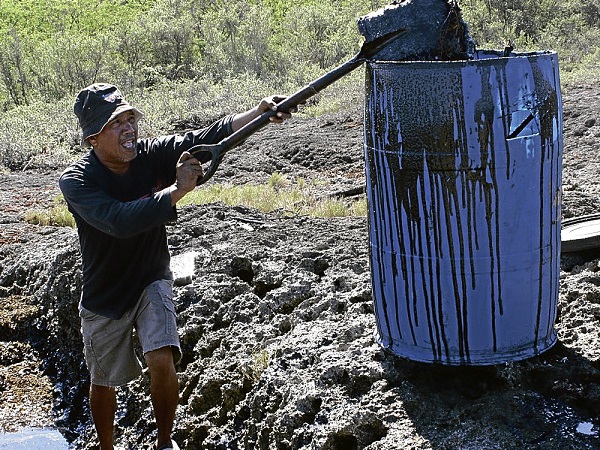Oil sludge removal starts in Ilocos

A WORKER of the Community Environment and Natural Resources Office in Candon City helps remove the oil sludge that settled on the city’s shores. LEONCIO BALBIN/INQUIRER NORTHERN LUZON
DAGUPAN CITY—Using shovels, rakes and dust pans, and even spoons, government employees, residents, fishermen and volunteers from different towns of La Union tediously scooped and gathered the coagulated oil that had reached coastal areas here.
Reports from local governments and the Philippine Coast Guard (PCG) said the gel-like substance or sludge from a sunken Myanmar vessel or another ship had reached as far as the coastline of Paoay, Ilocos Norte.
In La Union, at least 200 sacks of the sludge had been collected from the towns of San Juan, Luna, Bangar, Balaoan, Bactonan and San Fernando City in the last three days, said Ranilo Ipac, chief of the Provincial Disaster Risk Reduction and Management Council.
“We have to do it manually as using chemical dispersant, while fast, could harm the environment. Anyway, the oil has solidified and chunks are floating so these can be collected manually. Most of the sludge stick to seaweeds and are easier to gather. The ‘pebbles’ or smaller clumps are collected using spoons,” he said.
Melchito Castro, Office of the Civil Defense regional director, said the sludge would be turned over to the PCG, which would conduct tests to determine the kind of oil that had spilled into the region’s waters.
Article continues after this advertisementCastro said by knowing the kind of oil, authorities can identify the cargo vessel that could have caused the disaster.
Article continues after this advertisementResidents and officials suspected that the sludge came either from the Myanmar vessel, MV Harita Bauxite, that sank last week in Bolinao, Pangasinan, or from a cargo vessel that was seen off Bangar, La Union.
“It was after the cargo vessel was seen off Bangar when oil started to flow in the waters of the province,” Castro said.
Earlier, Joel Salvador, Environmental Management Bureau director in the Ilocos, said the material could be bunker oil that leaked from the sunken ship carried by waves to the shore.
The PCG, in a news release posted on its website, said an oil leak occurred as the MV Harita Bauxite encountered engine trouble and sank off Cape Bolinao.
One of the ship’s crew members died while 14 others are missing and feared dead or rescued by passing ships. Nine others survived, the PCG said.
In a statement, La Union Gov. Manuel Ortega said the provincial government would exert all efforts “to make those who caused the damage to the environment be held accountable.”
In Ilocos Norte, Capt. Pablo Gonzales Jr., PCG district commander, said traces of oil were seen along the shores of Barangay Masintoc in Paoay.
Gonzales, however, said not all coastal villages in Ilocos Norte and nearby Ilocos Sur are affected by the spill.
“We saw patches of oil in those areas (Masintoc and Santiago, Ilocos Sur). The oil traces are trapped there,” he said. Yolanda Sotelo, Gabriel Cardinoza, Cristina Arzadon and Leoncio Balbin Jr., Inquirer Northern Luzon